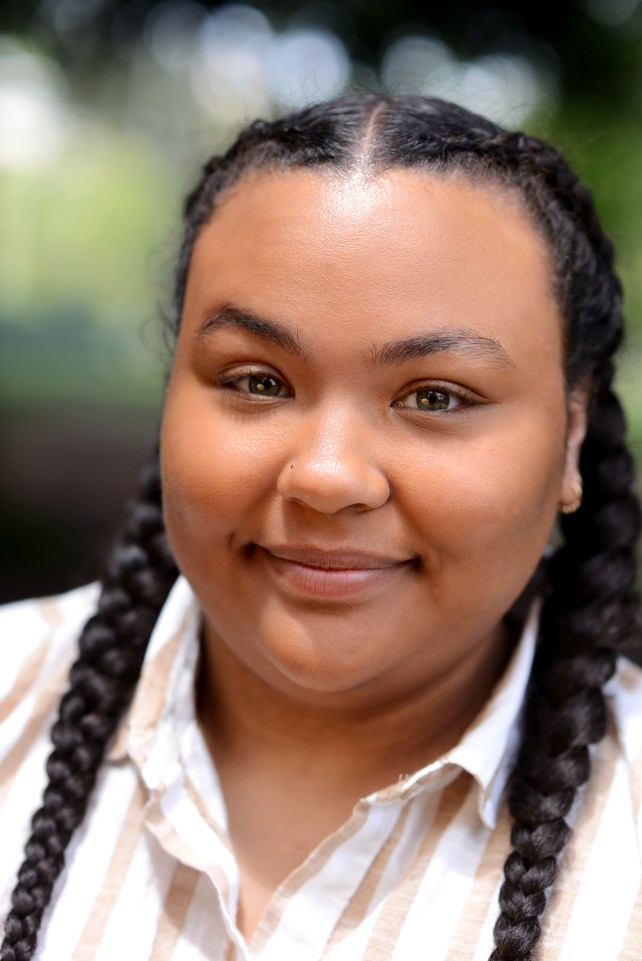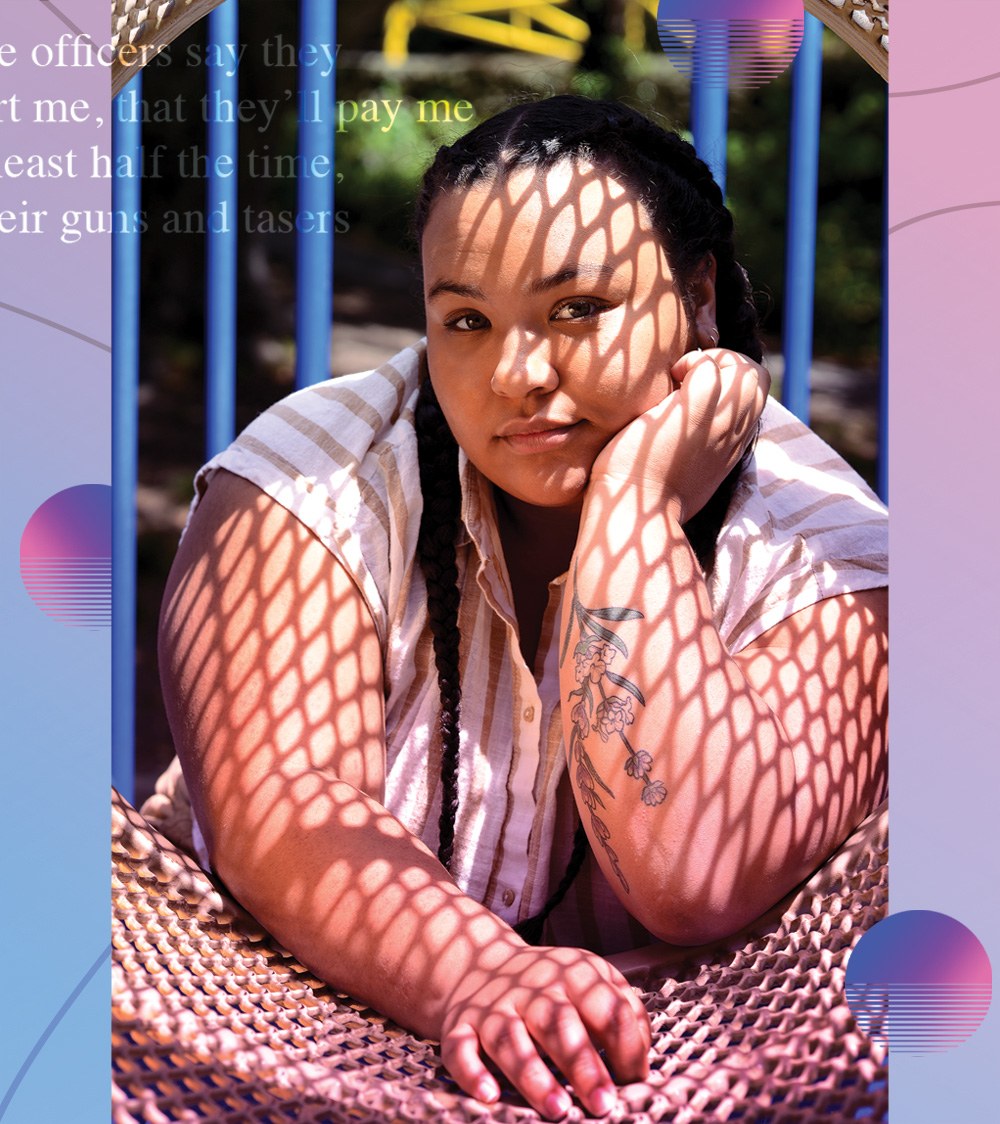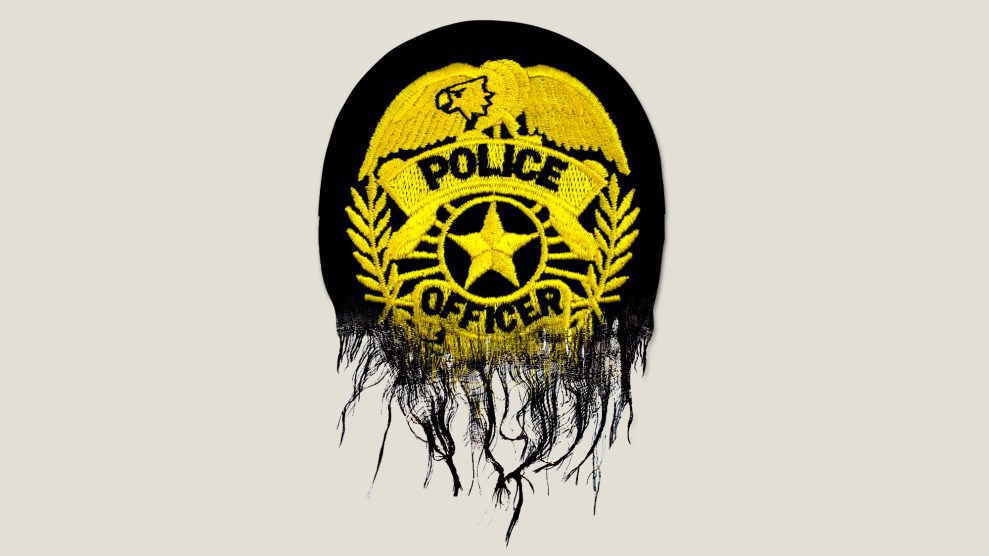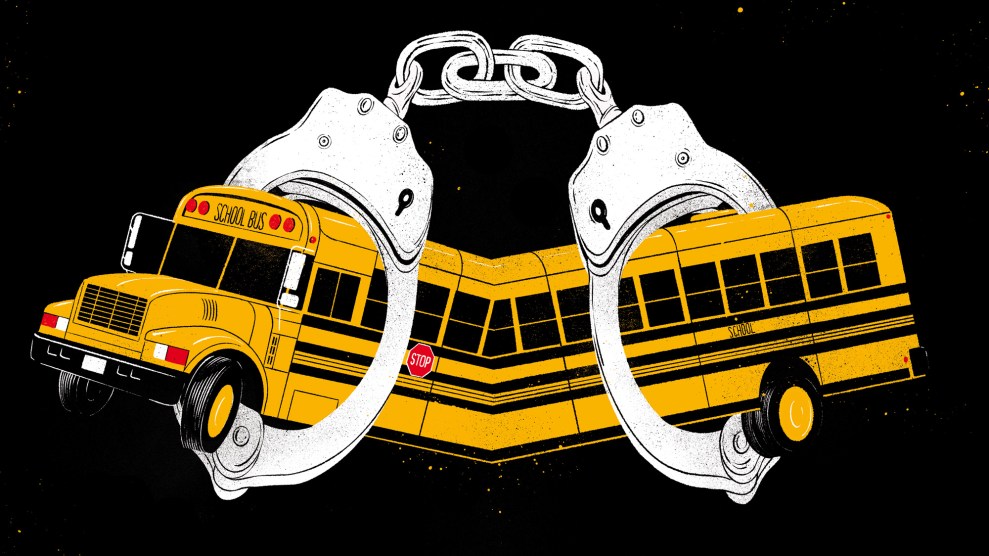In May 2016, a secret within the Oakland Police Department exploded into the public eye: Multiple officers were under investigation for sexually exploiting the teen daughter of a 911 dispatcher, including trafficking her when she was underage. The news sent shockwaves across the city, as residents learned that department higher-ups had known about the misconduct for months. The teen, a sex worker known as Celeste Guap, told reporters she had sex with more than two dozen cops in the Bay Area—for money, protection from arrest, and tips about undercover raids. In interviews, she wavered between self-blame and acknowledging the abuse. “Thinking back at it, yeah, you know, I do now see myself as being a victim,” she told one reporter. “Because I do feel I was taken advantage of.” (Four of the officers ultimately pleaded no contest to charges; other charges were dropped and Guap received a settlement from the city.)
For more articles read aloud: download the Audm iPhone app.
To Leila Mottley, a 13-year-old budding poet and writer watching the news from her East Oakland home, Guap’s story was a revelation. Since Mottley was 11, she had been dealing with unwanted attention from men on the street—men who catcalled or whistled at her or even cornered her as she walked home from her bus stop in the rain. As she watched Guap say, “These men preyed on me,” Mottley recalls, “I remember being really struck by it as a young teenager, existing in this city where I had experienced the ways that my body was vulnerable, but didn’t often see it reflected back to me, or even acknowledged.”
Mottley, who is Black, had long listened to warnings about cops from her father, who grew up amid the protests of 1960s Detroit. He told stories about being detained without cause, and “all the ways that we can and cannot operate when the police are around, or white people are around.” But “my talks around policing as a kid were never about what policing looks like for women, or sexual harassment,” Mottley says. “No one gets that talk…I think, because, what would you say?”
Six years later, Mottley—now a self-assured 19-year-old with piercing green eyes, a nose stud, and a sprig of lavender tattooed on her arm—has answered her own question with Nightcrawling. The debut novel imagines the inner life of Kiara Johnson, a 17-year-old who becomes a sex worker to afford a rent increase and ends up trafficked by Oakland cops, only to be thrust into a public spotlight when the scandal goes public, just like Guap. Deeply rooted in East Oakland—“where we keep our buildings low to the ground and our feet to the sidewalk”—the novel explores Kiara’s joy and grief and search for belonging in the city she loves. Mottley completed it at 17, immediately after graduating high school early. The Black Southern writer Kiese Laymon has called it “the most compelling book written by an American teenager in my lifetime.”

“I knew that I wasn’t going to be able to write this book in 10 years, and do it the same justice,” Mottley says.
Sidra Greene
Mottley wanted to write the novel in part to shine a light on how women, especially young women of color, experience abuse at the hands of the police. According to an Associated Press investigation, between 2009 and 2014, 990 police officers lost their licenses due to sexual misconduct allegations—a number that experts say barely scrapes the surface. “In the vast majority of jurisdictions, survivors of police sexual violence are pointed in a single direction: the police,” the attorney and abolitionist organizer Andrea J. Ritchie writes in her book Invisible No More: Police Violence Against Black Women and Women of Color. Meanwhile, police unions have fought fiercely to make sure that investigations into sexually abusive cops stay out of civilian oversight. Perhaps that’s why only a few individual cases crest the public consciousness, like Guap’s, or the 2015 trial of Daniel Holtzclaw, who was convicted of sexually assaulting eight Black women in Oklahoma City.
Yet we do know that where there’s one survivor, there are often more. And that those targeted are often underage or extra vulnerable to officers’ authority—people in custody, participants in police explorer programs, or sex workers like Nightcrawling’s Kiara. “What choice did I have, though,” Kiara narrates. “The officers say they ain’t gonna hurt me, that they’ll pay me and, at least half the time, they do. Their guns and tasers have a bigger presence in this room than their bodies and even when I try to say no, they just laugh. They like that I’m young, that I don’t know what I’m doing, and I keep on telling myself it’s only for a while, that they’ll let me stop when I want to.”
Kiara’s voice—simultaneously childlike, lyrical, and fierce—is the most unforgettable element of Nightcrawling. “I knew that I wasn’t going to be able to write this book in 10 years, and do it the same justice,” Mottley tells me in April, over lattes at a Black-owned coffee shop along International Boulevard, the well-known sex work corridor in East Oakland. “I wanted the book to read as a 17-year-old’s writing, because it’s from Kiara’s perspective. We’re supposed to be able to see her as a kid. And I wanted to be able to do that when I could write like that.”
Mottley learned to love language at a young age. Thanks to her father, an arts fundraiser and playwright, and her mother, a preschool teacher, “I was lucky to be surrounded by books that did reflect me,” Mottley points out. In particular, she was entranced by Sassafrass, Cypress & Indigo, a novel by poet and playwright Ntozake Shange about three artist sisters from the South. It was one of the first stories of Black girlhood that Mottley encountered, written in a style that felt devoid of rules. “I remember feeling the liberation of reading this book,” she says. “Feeling like it was a book that had been written for me.”
Starting in sixth grade, Mottley attended Oakland School for the Arts, where she got top grades and performed in the theater program. In her free time, she wrote poetry about nature and the emotions of middle school, then short stories, and, before long, books. She finished her first novel at 14, her second two years later. (“Practice novels,” she calls them.) “Leila has literally always done it all,” says her childhood friend Magdalena Frigo. She was “literally always so inspiring. And it was never shoved in your face.”
Mottley’s skill with words began to attract public attention after teachers in the school’s literary arts program encouraged her to apply to Oakland’s youth poet laureate program, a competition judged by local luminaries and run through the public library. After two years as a runner-up, Mottley was named the city’s youth poet laureate in June 2018. Two weeks later, a white man slashed the throat of an 18-year-old Black girl named Nia Wilson on an Oakland train. “Every panic attack has become a memorial and yet nothing is buried,” Mottley wrote in a poem afterward. “Every Black woman in Oakland be a walking altar.”
Many of her high school classmates were “SoundCloud rappers who had really big dreams,” and Black Lives Matter protest chants sometimes reverberated through the classroom windows. Experiencing those mass uprisings was “formative,” Mottley says. But she noticed that the call-and-response of “Say her name” for Rekia Boyd or Sandra Bland was often quickly subsumed by lists of men killed by police. “I remember the first time this happened, and being like, ‘Huh,’” Mottley says. “And the second time, and the third time. It reminded me, really, of the way that people do anything to not see Black women. Even movements created by Black women.”
This frustration is echoed by her character Kiara, who leaves the Oakland Police Department headquarters to find a group outside protesting the death of Freddie Gray. “I wonder if they’ll ever chant about the women too, and not just the ones murdered, but the particular brutality of a gun barrel to a head,” Kiara wonders. “The women with no edges laid, with matted hair and drooping eyes and no one filming to say it happened, only a mouth and some scars.”
“I wanted to have this book recognize that police sexual violence—what Kiara experiences—is in direct conversation to all movements around police brutality,” Mottley tells me. It’s a theme she’s returned to repeatedly in her writing. “Sisters, we are entitled to our fear, to that quick pulse at the sound of a siren,” she recited at one Bay Area poetry slam in spring 2018. “Entitled to shout our brothers’ names, risk our lives for them, just as we do for our own. We got scars just as deep, bodies that still ain’t healed.”
After Mottley graduated early from high school to have more time to write, she completed Nightcrawling in a single summer. In Kiara’s story, she explored her own anxiety of existing on the streets of her city, which feel at once like home and a hunting ground. “Especially for Black girls, being a teenager doesn’t make sense. There’s the sexualization, but there’s also the minimization that comes with, ‘Oh, you’re young, you don’t understand anything.’”
She also drew on experiences from her summer job at a preschool, where she wrote between shifts and during naptimes. Having kids around helped her develop Kiara’s relationship with Trevor, a young neighbor whom Kiara takes in after his mother disappears. When they play basketball and bake cakes with syrup, Kiara’s trauma is forgotten, replaced with joy. “I was experiencing every day what being around children does to a person,” Mottley says. “It really does allow us to exist in this, like, childlike state, where every moment is just the moment.”
Trevor is not the only child in Nightcrawling. Kiara is too—or she would be, if anyone gave her the chance. With her father dead, mother in a halfway house, and older brother “shooting his shot” as a hip-hop artist, it falls to Kiara to pay rent. She cares for Trevor and tries to stay in control as she walks the streets at night. Learning to recognize that the police exploitation wasn’t her fault—that she was young and vulnerable—is Kiara’s key to survival. “I wanted to make sure that by the end of the book that she looks to herself instead of looking to other people,” Mottley says, “and that she affords herself what the world hasn’t given her, which is the ability to see herself as a vulnerable person.”

It’s something Mottley is working on, too. She spent her freshman year in a “whirlwind” at Smith College, revising her manuscript, finding an agent, selling her book. “She was so diligent and really focused on getting it right,” says Samantha Rajaram, a Chabot College professor who helped Mottley revise the Nightcrawling manuscript. Balancing her writing with schoolwork was challenging, and the whiteness of small-town Massachusetts made Mottley ache for Oakland’s color and vibrancy. After the pandemic sent her home, she decided not to return to Smith after the first semester of her sophomore year. “I spent most of my adolescence doing everything, and losing sleep, and kind of sacrificing my body for it,” she says. “And I decided that I couldn’t do it. I think admitting that kind of saves me.”
Mottley is now writing full time, taking breaks to pole dance recreationally and swim laps, and readying herself for Nightcrawling’s release. “Having people read it is also really strange for me, because it lives inside of me,” she says. “It was just mine, and now it’s not just mine.”
She hopes the novel makes more Black girls “feel a little less lonely,” she says. “I hope that teenagers get to feel like kids a little bit, and reminded that they are kids. Sometimes teenagers don’t want to hear that.”









